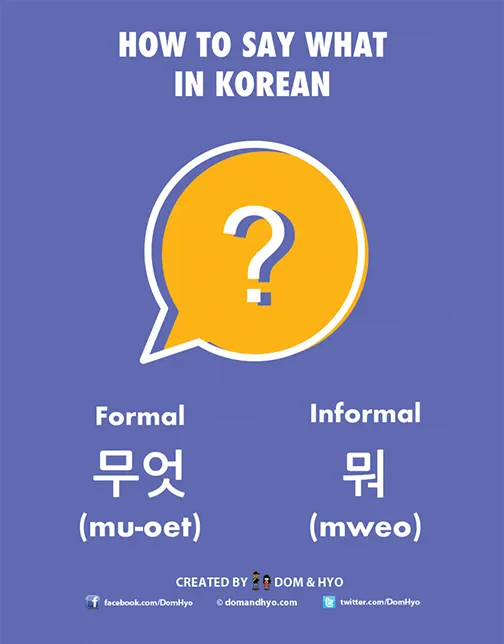
Hey everyone! Welcome to a new week. We hope you enjoyed your weekend. Today, we are going to teach you how to say “what” in Korean.
This fits in with other words like how, why, how, and where in that you need to know these. These words are very basic, yet if you know them, you will be able to combine them with many other words and phrases.
Let’s start off with the formal version:
무엇 (mu-eot)
The formal version is two syllables instead of one. It is also treated as a noun and used more in written Korean than spoken. Since it is a noun, the object particle “을” and the subject marker “이” can also be added to it. So for example in a sentence it would read like this:
무엇을 먹었습니까? (mu-eo-seul meo-geo-sseum-ni-kka) = What did you eat?
무엇이 문제입니까? (mu-eo-si mun-je-im-ni-kka) = What is the problem?
Notice that by itself, the word has a strong abrupt “t” sound at the end of it. This is common when the Hangul letter “ㅅ” is found at the end of a word.
Once you add the particle to the word, the “s” sound can be heard.
Now for the informal version:
뭐 (mweo)
The informal version contracts the formal version into a shorter word. You get the informal version like so:
무엇-ㅅ = 무어 => 뭐
This informal word is also used as an adverb instead of a noun. Subject markers and object markers can also be added to this word.
If we take the sentence example for 무엇 and change it to the informal version, we get this:
뭘 먹었어? (mweol meo-geo-sseo) = What did you eat?
뭐가 문제예요? (mweo-ga mun-je-ye-yo) = What is the problem?
Adding the object marker as 뭐를 is a bit awkward, so it changes to a single syllable word, 뭘.
And that’s it! Hope you enjoyed today’s lesson!
